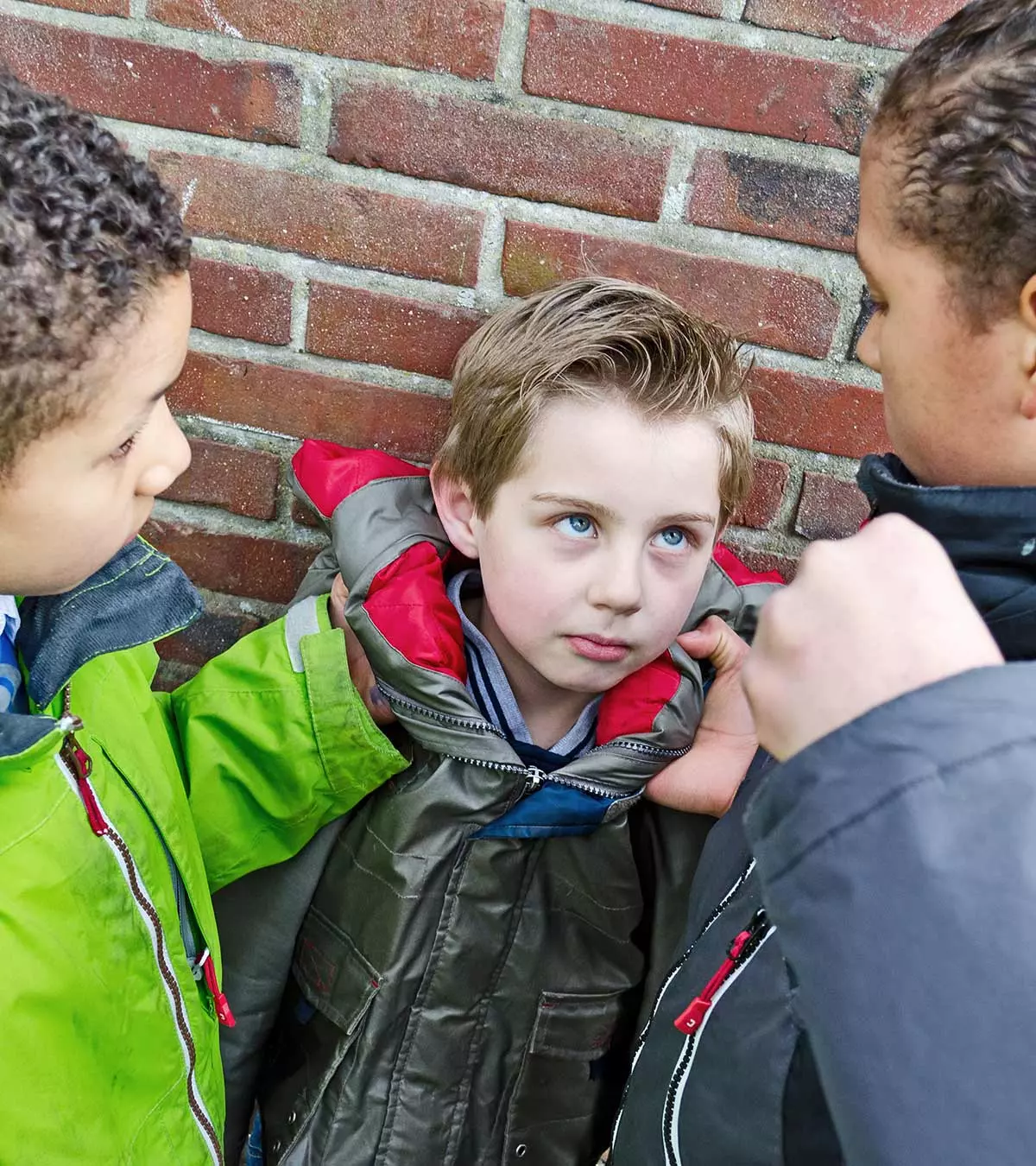
Image: iStock

As children reach their teenage years, you may find it difficult to handle them because their thoughts and behavior patterns change drastically. Some may also become narcissistic teenagers who are self-absorbed. These children are more likely to be unaware of others’ emotions and expect people to praise them.
Often, narcissism is a temporary behavioral change that occurs in many adolescents but tapers off after a few years. However, sometimes, some underlying causes may lead to personality changes. While many teens may exhibit typical adolescent self-centered behaviors, narcissism involves a need for admiration, a lack of empathy, etc., and you need to identify the signs early on. If you feel your children’s behavior affects their growth and development, you may take a professional’s advice.
Read this post to learn how to recognize the signs of narcissism in teenagers and ways to handle a narcissistic teenager.
Key Pointers
- Teenagers may exhibit narcissistic tendencies which include self-indulgence and a lack of empathy towards others.
- Teenage narcissism is characterized by feeling superior, exaggerating talents, seeking praise, lacking empathy, judging others, struggling in relationships, and resisting growth.
- Teenage narcissists may struggle to handle criticism and may react aggressively.
- Parents can help deal with a narcissistic adolescent by paying attention to them, monitoring their social media interactions, and providing healthy coping mechanisms.
- If the teenager’s behavior hinders their growth and development, seeking professional assistance may be necessary.
Meaning Of Narcissism

Image: Shutterstock
Narcissism refers to a state of mind where a teen starts thinking extremely highly about themself, their self-image, and their physical appearance. As a result, they may become self-centered, always talking about their talents, looks, and capabilities, and develop attention-seeking behavior without being empathetic toward others (1).
Teenage Narcissism
Experts believe that today’s teens are fonder of nice things than those in the earlier generations used to be. Research also shows that while teens nurture a desire to have a luxurious life and get a self-identity, they are not willing to work hard to achieve that. In most cases, the feeling is superficial.
Teens long to earn huge money to maintain a luxurious lifestyle, but they do not want to work hard for it. There is a gap between a teen’s dreams and their willingness to work towards them.
This tendency is said to be increasing narcissistic trends in adolescents.
 Research finds
Research findsSigns That Your Teen Is A Narcissistic
Here are a few of the most common signs that will tell you whether or not your teen is turning into a narcissist (2) (3):
1. They feel they are better than everyone else
It is a classic sign that signals towards narcissism. Your teen may genuinely believe that he or she is better than everyone else, but it may not have anything to do with their personal achievements.
In many cases, he gets this feeling due to lifestyle factors, such as the locality you live, the car you or your teen drives, the type of clothes or brands that your teen wears, and the things your teen owns.
2. They exaggerate their abilities
Your teen may start bragging to friends about the many talents or gifts he or she has. For instance, they may tell friends that no one can sing or dance as gracefully as they can do. Your teen may start believing in the exaggerated version of self.
3. They expect praise from everyone
Whether or not your teen truly deserves to be honored, they start expecting it as a natural reaction towards them. Your teen may not have done anything out of the ordinary that deserves appreciation but may still get offended if no one says good things.
4. They do not think about others’ emotions

Image: Shutterstock
While your teen is constantly looking for praise and laurel, they may fail to recognize the emotions that others go through. It can become a situation where they get selfish, arrogant, develop egoism, and worry only about themselves. Anything that is not directly related to them becomes unimportant.
5. They look down upon other people
Your teen may not be as good as they think they are and will have a negative opinion about those whom they perceive to be inferior. Your child may also be outright rude to them.
6. They have difficulty maintaining relationships
If your teen keeps changing their friends or partners frequently, it could be due to their narcissistic attitude. When your teen treats others as inferior but expects admiration and praise, it could wreak havoc in any relationship.
7. They think they already know everything
Your teen will refuse to learn anything new as he or she feels that there is nothing new to learn. Your teen will have a distorted sense of intelligence and intellect, and do not want to learn anything from anyone.
 Quick fact
Quick factDealing With Your Narcissistic Teenager
If you observe these signs of narcissism in teenagers, here are a few tips to deal with the situation (4) (5):
1. Pay attention to your teen
You may think that this is what you should not do when your teen has such high self-esteem, but your child’s attitude often could be due to their craving for your attention. Help create a safe space for them to express their feelings and experiences with you. Tell your teen how important and valuable he or she is, and why they are special to you. It will be great for your teen to realize that their family always loves and values them.
 Quick tip
Quick tip2. Keep a check on your teen’s social media interactions

Image: IStock
Monitor your teen’s social media pages and their social interactions with friends and contacts. If you feel that your teen is rude or insensitive to others, make sure you talk to them about it and explain why such behavior is uncalled for. Put faith in your teen’s ability to behave and you may be surprised when they take a new direction.
3. Show them that appearance is not everything
Emphasize on the fact that looking good or wearing the best of brands does not reflect his inner self.
Tell them that they should let go of materialistic and superficial things at least once a week and see how the world does not notice.
Let your daughter remove makeup and wear simple home clothes. Do the same yourself and take a trip to the local grocery store. Ask her if she has felt like someone has looked down on her or has behaved rudely because of her simple looks. If you have a teen son, let him take a bus once a week instead of a car. Ask him how he felt about it and if someone looked down upon him for not traveling in a car.
4. Ignore their self talk
Start ignoring your teen if they constantly talk highly about themself. Do not criticize or try to correct them all the time. If you do not pay any attention, they may change their trend for good.
Melanie Tonia Evans, a mother, shares how she helped her son, Zack, come out of narcissism. She says, “The first example is that he used to skip cricket training. He was captain, and he narcissistically believed that ‘why go when I am entitled to open batting as I am the best batsman.’ And I used to argue, I used to threaten, I used to get angry, and I tried to guilt him into going because it totally went against my integrity not to go to training. However, when I learned healthy boundaries and honored myself, I stopped putting myself through that stress. Instead, I let Zack make his choice without argument, and then I had a discussion with his coach, who decided to bench him in the next game. So Zack was on the bench playing orange boy. Zack was distraught. He went crazy about it, but I let it happen, and I didn’t get pulled into the drama. I knew it was a divine experience for him. Zack never reneged on training again (i).”
 Quick tip
Quick tipTreat Your Narcissistic Teenagers Behavior

Image: IStock
Being narcissistic is not a health issue and you can surely help your teen get rid of it. Here’s how you can do that (2):
- Take your teen to a therapist, who will help them with various emotional regulation issues such as anger, depression, shame, guilt, inadequacy, self-consciousness, insecurity, or any other negative emotions.
- The therapist will talk to your teen and understand how they behave while going through these emotions. They will help your child change their outlook on their issues.
- The professional will also explain to your teen how bringing a change in behavior will affect their life and build stronger relationships with others.
- While teaching them to behave in a different way, the expert will also instill the values of empathy in your child. As a result, they will realize how their behavior could hurt someone.
- If your teen suffers from anxiety, stress, or depression, the therapist may suggest a course of medication to ease the symptoms. The medications will not help in treating your teen’s narcissistic behavior, but will help in anger, guilt, depression, or shame that trigger narcissism in them.
Guidelines From Experts
Here are a few parenting guidelines and tips that experts suggest to face your narcissistic teens:
- Regulate the allowance you give your teen to control their spending habits. It will help your teen realize the importance of saving money and spending it smartly. You might also want to consider having your teen earn money by doing chores.
- No matter how your teen chooses to behave, avoid the urge to step in and help in a tricky situation. For instance, if your teen was driving the car and bumped it somewhere, make sure that they face the consequences. Also, repair the damages using your kid’s money.
- Make sure that your teen understands the need to apologize when they have been rude or insensitive to others. If they do not proactively apologize after behaving badly with someone, point it out and make them do so immediately.

Image: Shutterstock
- Whenever you praise your teen or appreciate them for their efforts, limit it to that particular achievement rather than being generic. For instance, if your son made a beautiful painting, say something like: “I think you made a really beautiful picture here,” instead of saying: “I think you are a wonderful painter already.” This careful appreciation will let your teen understand that you are referring to the job done on the painting (6).
Frequently Asked Questions
1. At what age does narcissism develop?
Narcissism may develop in children around seven years of age (7).
2. Can childhood trauma cause narcissism?
Yes, childhood trauma may trigger narcissism. Experiencing different kinds of maltreatment in childhood may make one wait for other people to fulfill their needs. They refuse to adjust to others later in life. Overcoming episodes of severe trauma early in life may make them firmly believe that they are over others in strength and power (8). These experiences can make narcissistic children behave in a specific way, which is unlikely to change without proper guidance and support.
3. Are narcissists made or born?
The exact cause of narcissistic personality disorder is not defined. Childhood experiences, psychological factors, and genetics may contribute to its development. Narcissists may be said to be made as parental and social factors have been found to be responsible. For example, excessive praise, too much attention, and over expectations may develop self-centeredness and assertiveness in children. Similarly, judgmental parents, trauma, and abuse may have an impact on their mental health (8) (9).
4. Are narcissists ever happy?
Yes, narcissists are usually happy as their high-headedness, sense of being superior, and lack of self-doubt give them a feeling of well-being (10).
5. How does a narcissistic teenager treat their mother?
Narcissists are believed to lack empathy for people, whether friends or family members. So, they may place high demands on their mothers. Most of the time, they may only think about their gains and not cooperate with their family members. They may lack respect and trust, and blame their mothers for any challenging situation they might face.
6. Can doctors misdiagnose narcissism as ADHD?
ADHD frequently occurs alongside Cluster B personality disorders, including narcissistic personality disorder. Studies show that childhood ADHD may develop into personality disorders later in some individuals. Therefore, doctors are careful while assessing the conditions and use comprehensive assessment methods to diagnose them correctly (12) (13).
7. Does Adderall help treat narcissism?
Adderall is a combination of nervous stimulants used to treat impulsivity (14). However, assuming that this stimulant alone cures NPD won’t be correct. The optimal treatment of this disorder focuses on a combination of psychotherapy (long-term counseling and behavioral interventions) and medication management (15).
8. Is narcissism just a phase that all teenagers go through?
While it’s common for a teenager to show some self-centered behavior as they navigate their identity and explore their individuality, narcissistic traits go beyond a typical phase. Narcissistic personality traits are deeper and can lead to significant issues in relationships and personal growth. If such traits persist, intervention may be necessary to foster healthier interactions.
Narcissism refers to the behavior of thinking high about oneself while looking down upon others. Teenagers are vulnerable to negative influences that may make them self-centered and non-empathetic towards others. They look forward to a luxurious lifestyle without going through the pain to achieve one. This often leads to impractical expectations and frustration with failure. Parents need to provide constant support and the proper guidance to children to avoid such behavioral problems. A narcissistic teenager may eventually show improved behavior with age. Speak to a specialized therapist if your teen’s narcissism becomes worrisome.
Infographic: Dos and Don’ts Of Handling A Narcissistic Teenager
While it is normal for teenagers to be self-centered and to focus on their own needs and desires, narcissistic teenagers may go to extreme lengths to get what they want and may have difficulty considering the feelings of others. So, in this infographic, you can explore the strategies for dealing with a narcissistic teenager.
Some thing wrong with infographic shortcode. please verify shortcode syntax
Illustration: How To Handle A Narcissistic Teenager

Image: Stable Diffusion/MomJunction Design Team
Are you worried your child may be narcissistic? Learn the early signs and get advice from a professional on how to help them, in this informative video.
Personal Experience: Source
MomJunction articles include first-hand experiences to provide you with better insights through real-life narratives. Here are the sources of personal accounts referenced in this article.
i. What to do if your child has narcissistic tendencies.https://www.youtube.com/watch?v=sFpcTHrmw2c
References
- Narcissistic personality disorder.
https://medlineplus.gov/ency/article/000934.htm - Paroma Mitra and Dimy Fluyau; (2025); Narcissistic Personality Disorder.
https://www.ncbi.nlm.nih.gov/books/NBK556001/ - Narcissistic Personality Disorder.
https://www.helpguide.org/mental-health/personality-disorders/narcissistic-personality-disorder - How to Deal with a Narcissist
https://www.goodtherapy.org/learn-about-therapy/issues/narcissism/how-to-deal - Raising A Narcissistic Child.
https://www.theedadvocate.org/raising-narcissistic-child/ - Martin T. Stein, MD and Barbara Geller; (2015); Parenting to Prevent Narcissism and Develop Self-Esteem.
https://www.jwatch.org/na37302/2015/03/25/parenting-prevent-narcissism-and-develop-self-esteem - Eddie Brummelman et al.; (2025); Narcissism and Leadership in Children.
https://journals.sagepub.com/doi/full/10.1177/0956797620965536 - Narcissism as a consequence of trauma and early experiences.
https://www.counselling-directory.org.uk/articles/the-link-between-trauma-and-narcissism - Narcissistic personality disorder (NPD).
https://www.healthdirect.gov.au/narcissistic-personality-disorder-npd - Mohsen Joshanloo; (2025); Conceptions of Happiness Mediate the Relationship Between the Dark Triad and Well-Being.
https://www.frontiersin.org/journals/psychology/articles/10.3389/fpsyg.2025.643351/full - Eddie Brummelman et al.; (2015); Origins of narcissism in children.
https://www.pnas.org/doi/10.1073/pnas.1420870112 - Carlin J. Miller et al.; (2008); Childhood ADHD and the Emergence of Personality Disorders in Adolescence: A Prospective Follow-up Study.
https://www.ncbi.nlm.nih.gov/pmc/articles/PMC2637402/ - Diagnosing ADHD.
https://www.cdc.gov/adhd/diagnosis/?CDC_AAref_Val=https://www.cdc.gov/adhd/diagnosis/?CDC_AAref_Val=https://www.cdc.gov/ncbddd/adhd/diagnosis.html - 6 Things to Know About Adderall.
https://www.leehealth.org/health-and-wellness/healthy-news-blog/top-trends/6-things-to-know-about-adderall - Narcissistic Personality Disorder.
https://my.clevelandclinic.org/health/diseases/9742-narcissistic-personality-disorder
Community Experiences
Join the conversation and become a part of our nurturing community! Share your stories, experiences, and insights to connect with fellow parents.
Read full bio of Katherine Paxton
Read full bio of Sagari Gongala
Read full bio of Swati Patwal
Read full bio of Apoorva K
















